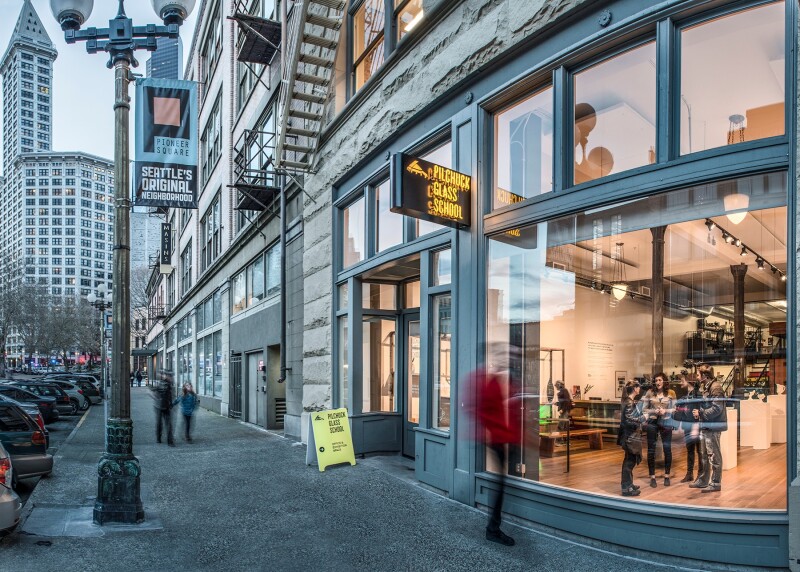Glassblower Nick Hawthorne dips the tip of a five-foot metal rod inside a furnace to remove a dollop of molten glass, then he doesn’t stop moving for half an hour. Once artists begin Seattle’s signature art form, they can’t stop rotating the rod until the liquid glob of glass is properly shaped. Hawthorne leads a lesson at Blowing Sands Glass Studio in the city’s northern Ballard neighborhood, where a newbie can help blow, shape, and twirl the metal rod to make that glowing lump a vase.
The hot shop is marking Seattle’s first annual Refract, an all-things-glass festival underway from October 17 to 20 in the heart of the American glass art world. Four days of artisan demonstrations, gallery parties, lectures, tours, and open studios celebrate a practice so widespread in the Pacific Northwest that it has more glass studios than Venice’s Murano island, where glassblowing was born in the 13th century. “I can throw a rock and hit six glass studios in this neighborhood,” says Blowing Sands founder David Smith, a hopefully figurative quip in this world of delicate creations.
The Pacific Northwest . . . has more glass studios than Venice’s Murano island, where glassblowing was born in the 13th century.
While the inaugural festival is the first time the city has hosted such a party for this community, it celebrates offerings that are largely available year-round. Like the artworks that spin nonstop once they emerge from the furnace, Seattle’s glass artists are forever in motion.
The Chihuly Experience
Refract’s kickoff party was held at the Chihuly Garden and Glass gallery at the foot of the Space Needle, under a 100-foot hanging sculpture by famed artist Dale Chihuly. Intrigued by the practice while at the University of Washington, the local son studied glass working in Venice before returning to the Northwest, where he cofounded the Pilchuck Glass School in 1971 and laid roots for the local scene.

An exhibition space, open Tuesday through Friday, is part of the Seattle office of the Pilchuck Glass School.
Courtesy of Visit Seattle/Pilchuck Glass School
Since then, Chihuly and his team have placed exhibitions and giant sculptures around the world, famous for chandeliers of glass tentacles and multicolor blooms. In 2012 the Chihuly Garden and Glass opened as a permanent exhibit of his work, including an outdoor garden of Alice in Wonderland–like oversized flora.
Across Seattle’s Lake Union, the artist’s private studio is normally closed to the public, though Chihuly’s Boathouse is open for limited tours during the festival. Besides the artist’s work on display on walls, ceilings, and even inside the indoor swimming pool, the waterfront space features his collections of Pendleton wool blankets.
Up north, Pilchuck Glass School welcomes visitors for an annual series of spring tours and demos in May. The rustic campus, located on a tree farm that feels more like thick forest, first used only army tents to keep out the Northwest rains; now buildings include a tree house and Chihuly’s Cabin.
The Hot Shops
Seattle hot shops operate year-round, many welcoming a regular stream of onlookers. The region’s oldest, Glasshouse Studio, fittingly sits in historic Pioneer Square. Gaffers (aka artists) work daily behind the showroom of lampshades, ornaments, and jewelry. They remove spinning glass from the furnace and shape it with tools made from cherry or apple wood, or cup the hot piece with a stack of wet newsprint, giving the shop the smell of a campfire just lit.

The art of blown glass began in Venice more than 700 years ago.
Courtesy of Visit Seattle/Jake Foltz
Blowing Sands offers its hands-on lessons to make paperweights, vases, and bowls using the glassblowing Seattle is known for. “The blown glass is the eye candy; it’s spectacular,” says owner Smith. Madrona’s Glassybaby workshop is known for its blown votive candleholders; launched to direct profits back to supporting cancer patients in 2012, it has since donated more than $10 million. Visitors can blow their own piece at the hot shop.
But blowing isn’t the only way artisans work with glass; at nearby Bazaz Studio, classes use kiln work to make sushi plates and drawer pulls. Beginners leave quick-starter classes at Seattle Mosaic Arts with a tile or trivet by nipping glass into tiny pieces.
Southern Migration
Born in Tacoma, Chihuly helped launch the Museum of Glass there in 2002. Live demonstrations are held in the Hot Shop amphitheater inside a 90-foot conical building that rises from the waterfront landscape. Its collections of modern glass art blend with temporary exhibitions, like Transparency: An LGBTQ+ Glass Art Exhibition, which is on display through late 2020.
A footbridge—open even when the museum is not—is decorated with 109 classic Chihuly shapes, linking the Museum of Glass to the block that holds the Tacoma Art Museum. There, its newest addition is the Benaroya Wing, built to house one of the largest private glass collections in the world.

People can visit artist Lino Tagliapetro’s Seattle studio and showroom during Refract weekend; typically it’s only open to the public on weekdays.
Courtesy of Visit Seattle/Lino Tagliapietra Studio
As rents climb in Seattle, artists are looking to cheaper cities like Tacoma to launch studios, but the region remains essential for the evolution of the art form. As she tours an exhibit she curated at Blowing Sands, Chihuly Garden and Glass executive director Michelle Bufano shows off new techniques and jarring themes, like a glass recreation of a razor blade and cocaine. “If you want to be a glass artist, you move to Seattle,” she says.
Refract runs Oct 17–20 across Seattle, with events in Tacoma, Everett, Stanwood, and Bainbridge Island. A number of hotels in the area are offering special packages for the weekend, some of which include a stunning glass-inspired dessert or a glassblowing class discount.











